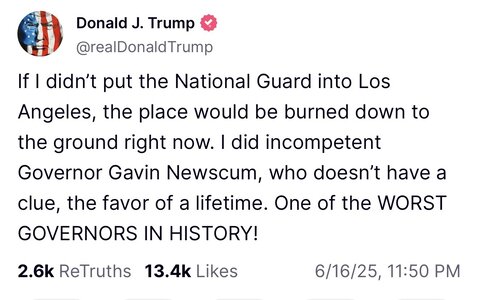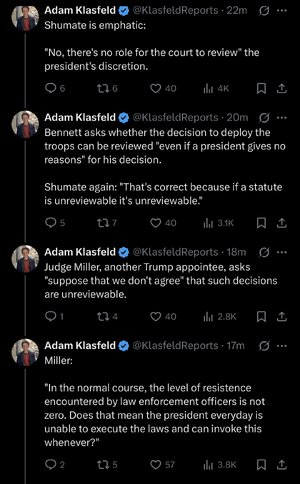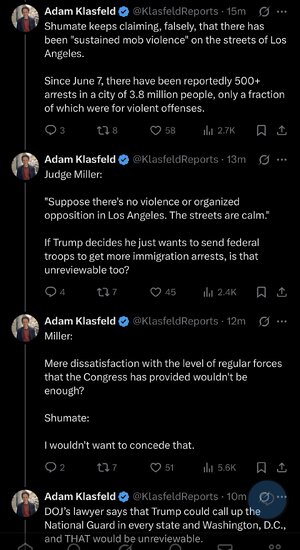Navigation
Install the app
How to install the app on iOS
Follow along with the video below to see how to install our site as a web app on your home screen.
Note: This feature may not be available in some browsers.
More options
You are using an out of date browser. It may not display this or other websites correctly.
You should upgrade or use an alternative browser.
You should upgrade or use an alternative browser.
America's Reichstag fire??? (ICE, Nat’l Guard & Military in LA)
- Thread starter BillOfRights
- Start date
- Replies: 455
- Views: 13K
- Politics
- Messages
- 2,281
What a shit human
BillOfRights
Iconic Member
- Messages
- 1,452
I would really like to read your take. Anything in particular make you think so?so seems like we have crossed the rubicon.
superrific
Master of the ZZLverse
- Messages
- 11,925
This was one of the reasons I retired from teaching. I felt I no longer could tell the truth and do my job. Kids aren't paying $40K a year in tuition or whatever it is now to hear the professors say, "eh, the law doesn't really matter any more."… “It’s a strange thing for me to say as a law professor that maybe the law doesn’t matter,” Chen said. “I don’t know that [Trump] particularly cares that he’s doing something illegal.”“
99.9999% of the law has nothing to do with Trump and there are millions of people trying to apply the law correctly every day in all sorts of ways.This was one of the reasons I retired from teaching. I felt I no longer could tell the truth and do my job. Kids aren't paying $40K a year in tuition or whatever it is now to hear the professors say, "eh, the law doesn't really matter any more."
If you want to talk about how judges or juries decide wrongly based on emotions and biases, rather than the text of the law, I could get behind that. But that has been true since the Middle Ages.
donbosco
Legend of ZZL
- Messages
- 6,466
This was one of the reasons I retired from teaching. I felt I no longer could tell the truth and do my job. Kids aren't paying $40K a year in tuition or whatever it is now to hear the professors say, "eh, the law doesn't really matter any more."
I often teach Education Classes or classes in which the students are considering becoming teachers. By far their greatest concern is "will I be permitted to tell the truth?"
superrific
Master of the ZZLverse
- Messages
- 11,925
Don't try to lecture me about my own experience, especially when you don't know what you are talking about. How many law school courses have you taught?99.9999% of the law has nothing to do with Trump and there are millions of people trying to apply the law correctly every day in all sorts of ways.
Imagine yourself trying to teach Con Law or Admin Law in an age of Bruen and Trump v. United States and Shelby County and the multitude of catastrophes last year. How? How do you teach 1L law students that the law matters when it clearly does not to the US Supreme Court. It's not Trump per se that is the problem; it's the lawlessness of the Supreme Court. And if you think the problem with the Supreme Court is that they are deciding cases based on emotions, then you have less understanding of the world than I had thought.
And don't get me started on corporate law. That's not exactly Trump related, but the quality of Delaware corporate law has eroded substantially in recent years. It has certainly become a lot less fun to teach or think about. That's largely because Delaware is racing to the bottom along with Texas.
Your particular specialties understandably color your view. The "law" is a lot more than bad Supreme Court decisions.Don't try to lecture me about my own experience, especially when you don't know what you are talking about. How many law school courses have you taught?
Imagine yourself trying to teach Con Law or Admin Law in an age of Bruen and Trump v. United States and Shelby County and the multitude of catastrophes last year. How? How do you teach 1L law students that the law matters when it clearly does not to the US Supreme Court. It's not Trump per se that is the problem; it's the lawlessness of the Supreme Court. And if you think the problem with the Supreme Court is that they are deciding cases based on emotions, then you have less understanding of the world than I had thought.
And don't get me started on corporate law. That's not exactly Trump related, but the quality of Delaware corporate law has eroded substantially in recent years. It has certainly become a lot less fun to teach or think about. That's largely because Delaware is racing to the bottom along with Texas.
ZenMode
Legend of ZZL
- Messages
- 6,074
It seems very, very unlikely that the cinder block throwers were exclusively of Asian descent or that those of Asian descent are more likely to throw cinder blocks.
Last edited:
- Messages
- 512
Eric doesn't need to be opening his mouth...ever
superrific
Master of the ZZLverse
- Messages
- 11,925
Fine. Law matters, except apparently not in the most important cases. I don't want to teach that either. You've got to remember: law students are pretty fucking far from practicing lawyers. Supreme Court opinions form the vast majority of reading materials in federal law courses until perhaps 3L year.Your particular specialties understandably color your view. The "law" is a lot more than bad Supreme Court decisions.
I guarantee you I'm not the only person who came to find teaching law depressing and dishonest for precisely this reason. Maybe contracts has been unaffected. I didn't teach contracts.
- Messages
- 2,281
superrific
Master of the ZZLverse
- Messages
- 11,925
This hearing is not going well. Trump judges are hassling the CA attorney on niggling points. They claim to be bound by dicta from an 1827 case, which is preposterous. That case involved a militiaman who didn't want to be mobilized DURING THE WAR OF 1812. And his justification was that the militia wasn't needed. Well, duh. Of course the militiaman cannot second-guess the president's orders. That's not even remotely the same thing.
The Trump judges are going to fold.
The Trump judges are going to fold.
- Messages
- 38,991
This hearing is not going well. Trump judges are hassling the CA attorney on niggling points. They claim to be bound by dicta from an 1827 case, which is preposterous. That case involved a militiaman who didn't want to be mobilized DURING THE WAR OF 1812. And his justification was that the militia wasn't needed. Well, duh. Of course the militiaman cannot second-guess the president's orders. That's not even remotely the same thing.
The Trump judges are going to fold.
Share:



